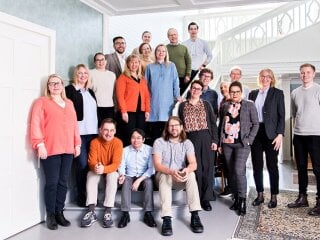"My role is to propose new potential targets to Orion's cancer researchers for drug development. I also monitor the progress of research projects and make sure that investments in them are worth continuing," says Juha Rantala, who works as Orion's Target Identification Lead in Turku.
Databases based on Nobel Prize-winning RNA interference technology are a key tool in Rantala's work. There are about 1,700 cancer cell models in total in the world, in which each gene defined for humans has been silenced one by one. Gene silencing is a method that allows for specifying the effect of individual genes on cancer cells.
"If we want to develop Orion's own solution for, say, prostate cancer, we first need to investigate whether cancer cells die when a particular gene is silenced. The next step is to find out from patient data whether these genes are associated with cancer specificity, i.e. whether cancer incidence or the aggressiveness of the disease is higher for example when mutations of these genes are present," Rantala explains.
If both criteria are met, the target is of interest for drug development. We then decide whether it is more feasible to try to obtain a licence on the basis of the groundwork started by someone else or to develop our own new drug molecule, which is a much longer process.
Identify the best of the good targets
Rantala is one of the world's most experienced researchers in this field, having already identified several potential targets for cancer drug development. At Orion, he is supported by an organisation around him that can explore and harness the potential of his discoveries.
"I use genetic mapping of cancer samples, which reveals, for example, the replication of specific genomic ranges. I also use mutation studies to describe the effects of a mutation on the function of the target protein, such as an increase in enzyme overactivity," says Rantala.
I use genetic mapping of cancer samples, which reveals, for example, the replication of specific genomic ranges.
Top international research – how corporate partnership led to Orion
By training, Rantala is a cell biologist and started his career at VTT's drug development biotechnology department under Professor Olli Kallioniemi. He also wrote his doctoral thesis for VTT, on high-throughput screening. In his thesis, Rantala investigated how RNA interference can be used to identify genes and processes in cancer cells that can be used to treat cancer by inhibiting their function.
From VTT, Rantala was invited to work a research professor at the Knight Cancer Institute in Portland, US, where Rantala moved in 2011, the day after he defended his dissertation. While in Portland, he worked with notable scientists, such as Brian Druker, who is known for his pioneering work in the development of personalised medicine, particularly in the treatment of leukaemia, with him and his team having developed a revolutionary drug for the treatment of chronic myeloid leukaemia.
After returning in Finland, Rantala established his own business, Misvik Biology, in 2014 to collaborate with universities, pharmaceutical companies and private cancer clinics.
Since its establishment, Misvik Biology has been Orion's partner in service research for new cancer drugs. Eventually, Orion proposed closer cooperation with Rantala and Rantala joined Orion as its Target Identification Lead in late 2022.
Innovation is the key to success in the competition for new drugs
Rantala was familiar with the management of Orion's cancer research team and its strong team spirit.
"Working at Orion is really exciting: I really feel I’m in the right place at the right time. At some point I felt quite frustrated with drug development because the chasm between a research company and a big pharmaceutical company was so wide. But now I am in a position where I can propose interesting targets for new medicines and can accelerate ongoing projects," says Rantala.
Working at Orion is really exciting: I really feel I’m in the right place at the right time.
"I've seen successful drug development projects up close and I know how much can be created from just small innovations and fine-tuning of thinking. My ambition is to be part of bringing in a new mindset at Orion."
According to Rantala, Orion's strength in drug development is its world-class expertise in synthetic medicinal chemistry. Now the company also wants to focus on the latest genomic research in cancer.
"Competition in this area of drug development is fierce, so we need to be innovative and find our own angle if we are to stay at the cutting edge of the industry."
Teamwork for the benefit of the patient
"As a researcher, I am proud to have been able to help people who have had a very difficult time with cancer. I this job, you learn something new every day. The research I am involved in at the moment will have tangible benefits for patients in the future."
The research I am involved in at the moment will have tangible benefits for patients in the future.
Rantala’s work takes up much of his time, but free time is also important. He loves his classic vehicles: Rantala owns a collection of classic Vespa scooters, VW Beetles and boats. The Turku archipelago is also important to Rantala.
"My leadership style is based on leading from the front. I work for everyone and, by my example and input, I motivate the whole team work for the benefit of the patient. I am not an onlooker. This work cannot be anything but a team effort: projects require so much creativity and thinking that working solo is not possible."











